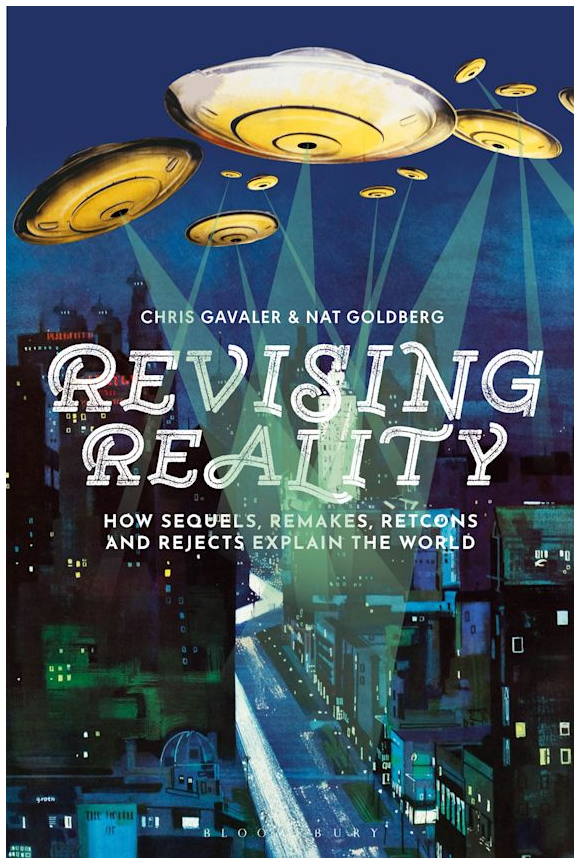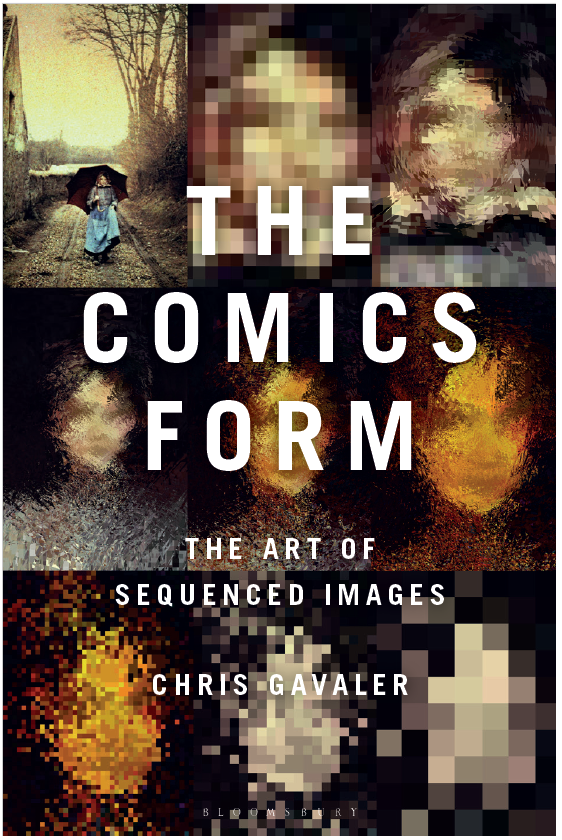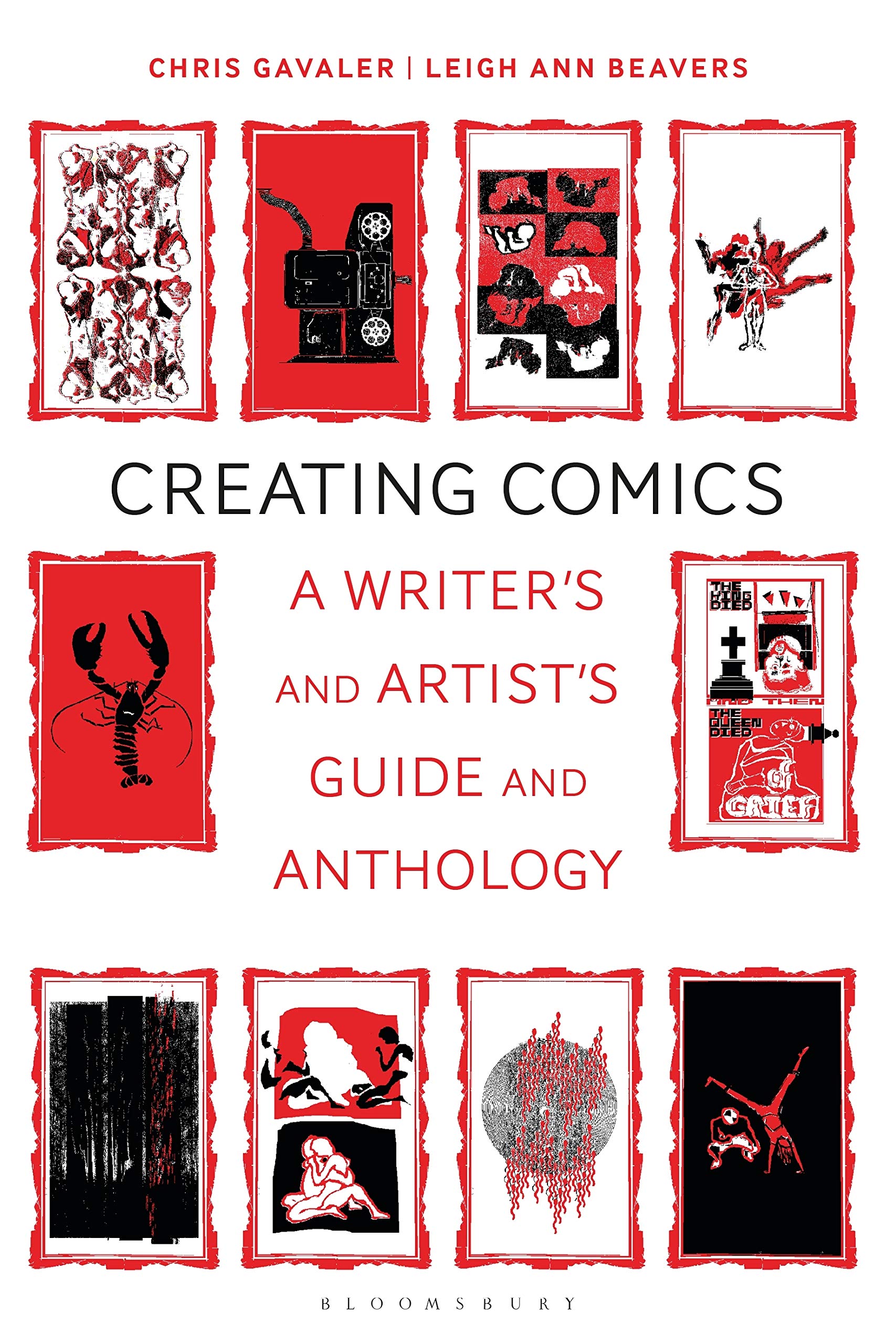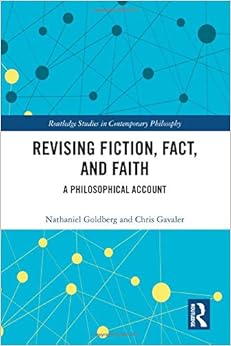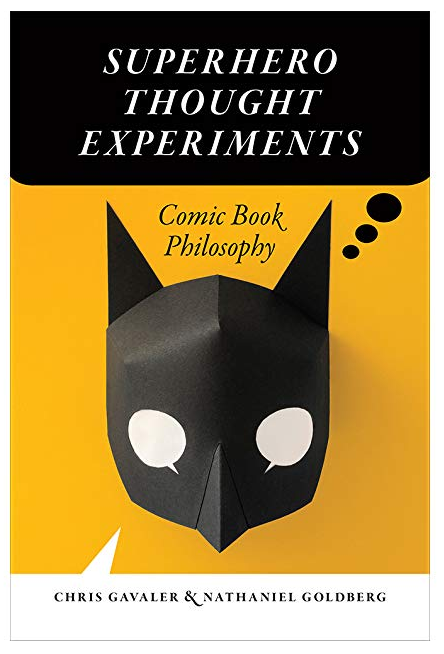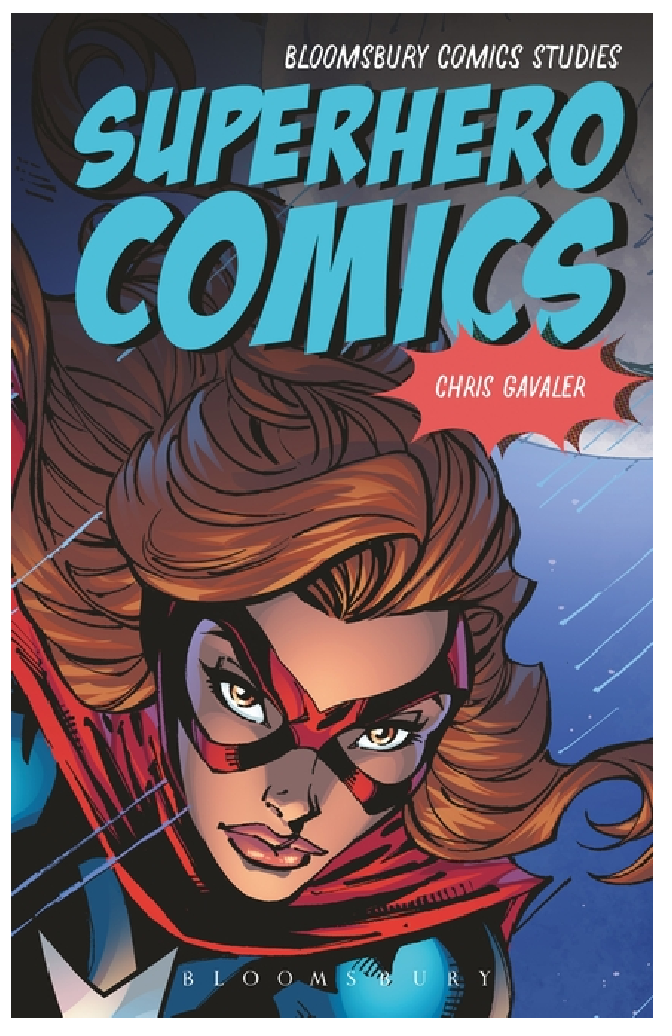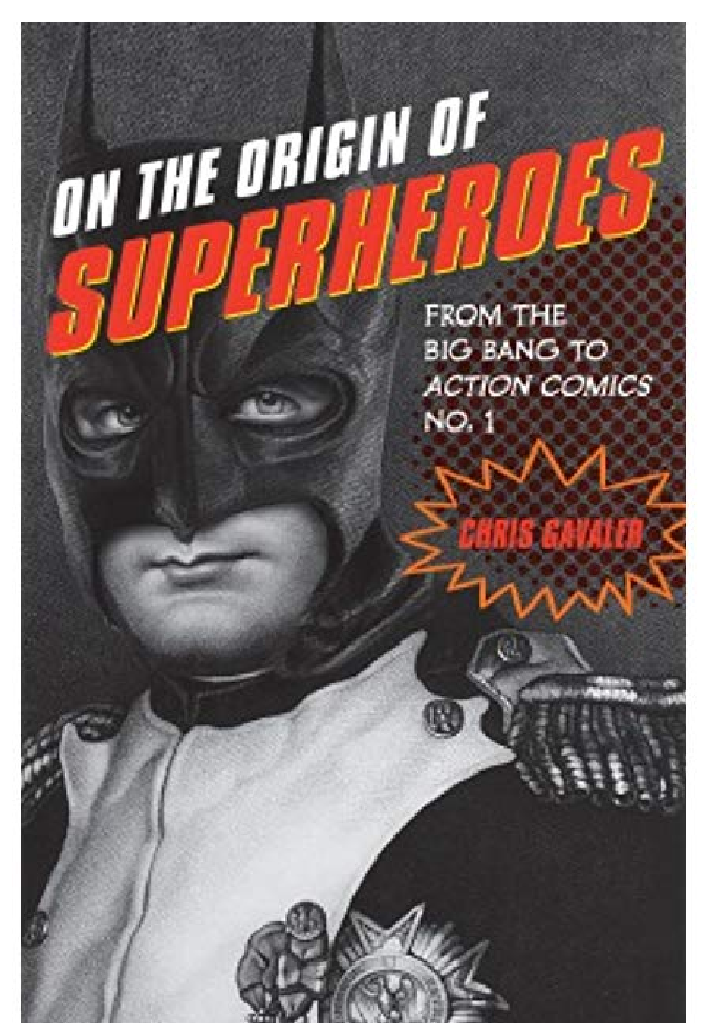Monthly Archives: August 2020
31/08/20 Predicting the Next President
First a reminder: the 2016 polls predicted Clinton would beat Trump by 3%. She instead beat him by only 2%–in the popular vote, which was all anyone cared about back then. Now we know better. It’s the Electoral College, stupid.
That’s good news for Trump, because his chances of winning the popular vote are essentially zero. He’s the first president in polling history never to have a positive approval rating. He’s hovered around 42% for most of his term.
But that’s where Trump’s good news stops.
Of the twelve presidential election forecasters, nine predict Biden will win the Electoral College. None predict Trump. Three are undecided but heavily favor Biden. None favor Trump. Trump’s electoral count ranges from 164 to 204. Biden’s ranges from 268 to 325. You need 270 to win. Here’s the list, starting with best for Biden and ending with best for Trump:
Princeton:
325 Biden, 187 Trump
JHK:
319 Biden, 163 Trump
Inside Elections:
319 Biden, 187 Trump
Niskanen:
318 Biden, 125 Trump
The Economist:
308 Biden, 164 Trump
Cook Political Report:
308 Biden, 187 Trump
FiveThirtyEight:
307 Biden, 185 Trump
NPR:
297 Biden, 170 Trump
U.S. News:
278 Biden, 186 Trump
CNN:
268 Biden, 170 Trump
Politico:
268 Biden, 203 Trump
Crystal Ball:
268 Biden, 204 Trump
Trump is at best 66 votes short, and Biden is at worst two short. All twelve forecasts place some states in the toss-up range, leaving their electors unknown. The number of toss-ups in each forecast ranges from two to six, with a total of nine different states. Here’s the list, from most to least commonly identified as toss-ups:
North Carolina 12, Arizona 8, Georgia 7, Ohio 7, Florida 4, Wisconsin 4, Iowa 3, Texas 1, Minnesota 1.
North Carolina is unanimously in play, and it’s probably equally safe to ignore outliers Texas and Minnesota, leaving a total of seven serious toss-ups. (Though if you define a toss-up as any state where neither candidate is currently leading by more than five points, you would instead have to leave in Texas and Minnesota, add Nevada and Arkansas, and strike Florida.)
This is not unlike last November when, according to the four earliest predictions, there were eight possible toss-ups: Arizona, Wisconsin, Florida, Pennsylvania, North Carolina, Michigan, New Hampshire, and Iowa. But note which two states are no longer in any of the forecasts’ toss-up categories:
Pennsylvania and Michigan.
Those were two of Trump’s key victories in 2016. Since Trump and Clinton were polling within the margin error, both states were toss-ups then. Now neither are. All twelve forecasts predict Biden will win both.
Worse for Trump, over half of the current forecasts have Ohio and Georgia in play, two states Trump won easily in 2016. Still worse, for Trump to win in 2020 he has to sweep all seven toss-ups. Biden has to win any one of them, giving him seven different paths to victory.
But of the seven, one stands out:
Wisconsin.
It was the one actual upset in 2016. Clinton was polling just above the margin of error. Instead, Trump took 1,405,284 votes to Clinton’s 1,382,536. That’s a difference of 22,748 from just under 2.8 million total.
And Wisconsin looks just as key in 2020. The three forecasts that place Biden at 268 electors identify Wisconsin as a toss-up. Eight of the nine forecasts that place Biden over 270 predict he will win Wisconsin. There’s only one exception. NPR identifies Wisconsin as a toss-up, but they also predict Biden will win Florida, still putting him over the top. Seven other forecasts give Florida to Biden too, as do the current polls. None give Florida to Trump.
What does this all mean for November? Nothing. These are just predictions. And given the unknowns of voting during the pandemic, predictions may be significantly less predictive this year. Fortunately, Virginians have some excellent voting options:
1) you can wait till November 3rd and cast your vote as you’ve probably always done,
2) you can order an absentee ballot and vote by mail, or
3) starting 45 days before election day on September 18th, you can vote in-person at your town hall or municipal building during regular business hours, plus some Saturdays.
So if you want to prove the predictions right, go vote. If you want to prove the predictions wrong, go vote too. That’s one thing all Americans can agree on: it’s the vote that matters.
- 2 comments
- Posted under Uncategorized
29/08/20 The FINAL Zombie Monologue: “Zombie Klansman”
I didn’t think we’d stage this monologue. I wrote it years ago, even before the Charlottesville Unite the Right Rally, but it resonates more horrifically this summer of BLM protests and tumbling Confederacy monuments. When it came time to convert my play The Zombie Life into an online preview of excerpts, I didn’t think any of the actors would want to perform “Zombie Klansman.” I was wrong. They were all willing, voting it to the top of their must-perform list. The producer was understandably hesitant. Firehouse Theatre is only two blocks from the Lee statue on Richmond’s Monument Avenue. But then the director (who not coincidentally is my sister) proposed an interactive staging that pushed the limits of Zoom, and now, after the addition of a trigger warning, it is the finale of The Zombie Monologues.
All six performances are here.
THERAPIST:
While observing my former patients, the ones who have volunteered to embrace the emotional peace of the zombie life, I’ve discovered that certain objects, certain physical possessions seem to carry a kind of psychological charge in them, a residue of memory, of identity. They’re haunted. Of course anything that forces a former convert to re-experience emotional pain is a dangerous object. But some dangerous objects are more dangerous than others.
For this week’s final experiment, our final testimony before bringing the Zombie Life seminar to you live next year in the Firehouse theatre, I would like everyone to witness the transformative horror of a dangerously haunted object—and so help you recognize the need to relinquish all human connections that bring only pain and suffering to our lives. Thank you.
ZOMBIES:
I hated black people. Like my daddy did. It’s a heritage thing. If they’re so pissed about being slaves why not ship back home to Africa already? Take the Indians with you. Both kinds. And the Mexicans, obviously. Asians. I could stomach. They got a work ethic. Especially in bed. Even if they smelled funny. Worse now. We all do. It’s the rot. It’s hard picking any of them out of a crowd anymore. It’s like I’m going color blind. Everything is gray. Everybody. A sort of greenish gray, with darker, flaky bits where it’s really bad. You’d be surprised how fast skin spoils. Pretty soon we’re all one color. One race. It’s like pinko heaven around here. We all rot at the same rate. Three words: e-fucking-quality. What the negro lovers were trying to breed us down to. This got the job down a hell of a lot faster. Not that I’m complaining. No more illegals stealing the jobs. No government hand-outs bleeding my paycheck. No more mongrel babies. No half-bloods. Or blue bloods either. It all drains out. Blood is blood. Every drop of it. Hard figuring what we got so rabid about. So bloodthirsty. Life will do that to you. Make everything look so black and white. Gray is better. Skin is skin. I don’t hate you. I just need you dead. I just need everybody dead.
the ZOMBIE monologues
by Chris Gavaler
directed by Joan Gavaler
August 19-30, 2020
the ZOMBIE monologues is a fully virtual prequel to our world premiere of Chris Gavaler’s THE ZOMBIE LIFE that we’ve had to postpone due to COVID-19.
Videos will premiere at 4pm on 8/19, 8/21, 8/23, 8/25, 8/27, and 8/29 at these 3 links
https://www.facebook.com/FirehouseTheatre/
https://tinyurl.com/zombiemono
https://www.firehousetheatre.org/
Wed 8/19, Thu 8/20
Ken Moretti – Therapist + Keaton Hillman – Doctor
Fri 8/21, Sat 8/22
Marjie Southerland – Chef
Sun 8/23, Mon 8/24
Robbie Winston – Professional
Tue 8/25, Wed 8/26
Boomie Pedersen – Activist
Thu 8/27, Fri 8/28
Caity Brown – Volunteer
Sat 8/29, Sun 8/30
Ken Moretti, Keaton Hillman, Marjie Southerland,
Robbie Winston, Boomie Pedersen, Caity Brown – klansman
the ZOMBIE monologues has been developed by Firehouse Theatre with support from Aura CuriAtlas Physical Theatre through a series of Zoom workshops.
Videos will premiere at 4pm on 8/19, 8/21, 8/23, 8/25, 8/27, and 8/29 at these 3 links
https://www.facebook.com/FirehouseTheatre/
https://tinyurl.com/zombiemono
https://www.firehousetheatre.org/
donations gladly accepted at https://tinyurl.com/zommon or text “zombie” to 44321.
The Zombie Life: A Seminar for Humans Seeking Conversion
We know life is hard. When you are ready to stop searching for meaning and leave the pain behind, we are ready to help.
1. Zombies have no responsibilities.
2. Zombies feel no guilt, shame, or emotional pain of any kind.
3. Zombies don’t plan for the future.
4. Zombies are never judgmental, petty, jealous, or hypocritical.
5. Zombies are free of racism, sexism, and all other forms of prejudice and bigotry.
6. Zombies form no governments, run no businesses, consume no natural resources, and cause no harm to their environments.
7. Zombies are never uncertain. They never second guess. They have no regrets.
Performers:
Caity Brown
Keaton Hillman
Ken Moretti
Boomie Pedersen
Marjie Southerland
Robbie Winston
Production Team:
Joan Gavaler – Director
Dan Plehal – Movement Director
Todd Labelle – Production Designer
Tad Burrell – Set Designer
Annette Hairfield – Costume Designer
AC Wilson – Props Designer
Grace Brown – Stage Manager
- Leave a comment
- Posted under Uncategorized
27/08/20 The Zombie Monologues: “Zombie Volunteer”
Who would ever choose to become a zombie?
According to The Zombie Life, lots of people. It’s the premise of the play, and today’s “Zombie Volunteer” is the penultimate performance of the two-week premiere of the online Zombie Monologues, excerpts of the full-production we expect to stage next August at Richmond’s Firehouse Theatre when that other apocalyptic pandemic is over.
The link to all of the monologues is HERE. And stay tuned for the final performance, “Zombie Klansman,” Saturday at 4:00.
I admit it. Being dead is a hell of a lot simpler. Life. It was just too much. It was lonely. It hurt. There’s only so much Zoloft you can choke down. And the whole time you’re looking over your shoulder, flinching, bracing for it. You spend your whole life knowing exactly how the story ends. You die. Me. The only window into the universe, time, reality, everything, the center of the world. I just somehow magically “stop”? How can we be expected to understand something like that? We pretend it makes sense, but it doesn’t. We distract ourselves so we don’t have to keep thinking about it every unrelenting second. Get jobs, have sex, watch TV. And sometime in there somewhere maybe we fall in love. Which is great. Best distraction of all. It makes it all bearable. The waiting. For the inevitable. But it’s a trap. Because while you’re making life so nice and wonderful, while you’re making your life actually mean something, giving reason to the unreasonable, you’re only making death that much worse. Infinitely worse. Because that person you love, your husband, wife, mother, father, child, sister, brother, friend—they die too. Permanently. It’s not just you who “stops” now. That person you’ve hidden a part of yourself inside. That person you would kill for. Die for. They just disappear too? Everything between you, all that love. Gone. Forever. It’s monstrous. It’s monstrous. Who could live in a universe like that? I don’t want anything to do with it. I’d rather be dead. I just want to be dead. I want everybody to stop trying to love me and just be dead already.
the ZOMBIE monologues
by Chris Gavaler
directed by Joan Gavaler
August 19-30, 2020
the ZOMBIE monologues is a fully virtual prequel to our world premiere of Chris Gavaler’s THE ZOMBIE LIFE that we’ve had to postpone due to COVID-19.
Videos will premiere at 4pm on 8/19, 8/21, 8/23, 8/25, 8/27, and 8/29 at these 3 links
https://www.facebook.com/FirehouseTheatre/
https://tinyurl.com/zombiemono
https://www.firehousetheatre.org/
Wed 8/19, Thu 8/20
Ken Moretti – Therapist + Keaton Hillman – Doctor
Fri 8/21, Sat 8/22
Marjie Southerland – Chef
Sun 8/23, Mon 8/24
Robbie Winston – Professional
Tue 8/25, Wed 8/26
Boomie Pedersen – Activist
Thu 8/27, Fri 8/28
Caity Brown – Volunteer
Sat 8/29, Sun 8/30
Ken Moretti, Keaton Hillman, Marjie Southerland,
Robbie Winston, Boomie Pedersen, Caity Brown – klansman
the ZOMBIE monologues has been developed by Firehouse Theatre with support from Aura CuriAtlas Physical Theatre through a series of Zoom workshops.
Videos will premiere at 4pm on 8/19, 8/21, 8/23, 8/25, 8/27, and 8/29 at these 3 links
https://www.facebook.com/FirehouseTheatre/
https://tinyurl.com/zombiemono
https://www.firehousetheatre.org/
donations gladly accepted at https://tinyurl.com/zommon or text “zombie” to 44321.
The Zombie Life: A Seminar for Humans Seeking Conversion
We know life is hard. When you are ready to stop searching for meaning and leave the pain behind, we are ready to help.
1. Zombies have no responsibilities.
2. Zombies feel no guilt, shame, or emotional pain of any kind.
3. Zombies don’t plan for the future.
4. Zombies are never judgmental, petty, jealous, or hypocritical.
5. Zombies are free of racism, sexism, and all other forms of prejudice and bigotry.
6. Zombies form no governments, run no businesses, consume no natural resources, and cause no harm to their environments.
7. Zombies are never uncertain. They never second guess. They have no regrets.
Performers:
Caity Brown
Keaton Hillman
Ken Moretti
Boomie Pedersen
Marjie Southerland
Robbie Winston
Production Team:
Joan Gavaler – Director
Dan Plehal – Movement Director
Todd Labelle – Production Designer
Tad Burrell – Set Designer
Annette Hairfield – Costume Designer
AC Wilson – Props Designer
Grace Brown – Stage Manager
- Leave a comment
- Posted under Uncategorized
25/08/20 The Zombie Monologues: “Zombie Activist”
Today is DAY FOUR of six for the online premiere of The Zombie Monologues. The “Zombie Activist” was a section I added to the full play The Zombie Life last year, and so long before this summer of BLM protests. It’s more than a little strange seeing it performed now in our current context. When it was time to cull the play down to a few monologues, I wasn’t certain I wanted to include this one, but the cast voted for it. So here it is.
The link to all of the monologues is here.
The final two sections, “Zombie Volunteer” and “Zombie Klansman” will premiere on Thursday and Saturday at 4:00.
There are only two kinds of people. I used to think it was men and women. The oppressive patriarchy and all that. It’s not race either, blacks and whites. I mean it is all about that, who is born with what, how much money, what color penis. Trust funds and tax shelters and it’s not my fault what your parents did or didn’t hand down to you, a work ethic, an entrepreneurial spirit. Almost anyone can make it if they really try probably, claw your way out of the melting pot, step on the heads of your opportunity-blind brothers and sisters. Food and not food. That’s all we are. Eaters and the eaten. I always felt bad about that. Social justice. I went to protests, chanted at rallies, marched and waved banners for my fellow whatevers. We are all one. Though I don’t actually live around here. My train ticket was first class. And we went to a nice restaurant afterwards, ethnic, because, you know, as long as I’m here, why shouldn’t I treat myself? Didn’t I earn it? Sure, maybe I started out with a leg up, but nothing is guaranteed. I work hard. I’m a good person. I’m not saying money is a virtue, but I’m not saying it’s not either. I’m better than lots of people, rich people. Actual rich people. The selfish ones. The greedy. I’m not greedy. I just have good taste. Everybody has to eat. Why shouldn’t it be something good? Why shouldn’t it be you?
the ZOMBIE monologues
by Chris Gavaler
directed by Joan Gavaler
August 19-30, 2020
the ZOMBIE monologues is a fully virtual prequel to our world premiere of Chris Gavaler’s THE ZOMBIE LIFE that we’ve had to postpone due to COVID-19.
Videos will premiere at 4pm on 8/19, 8/21, 8/23, 8/25, 8/27, and 8/29 at these 3 links
https://www.facebook.com/FirehouseTheatre/
https://tinyurl.com/zombiemono
https://www.firehousetheatre.org/
Wed 8/19, Thu 8/20
Ken Moretti – Therapist + Keaton Hillman – Doctor
Fri 8/21, Sat 8/22
Marjie Southerland – Chef
Sun 8/23, Mon 8/24
Robbie Winston – Professional
Tue 8/25, Wed 8/26
Boomie Pedersen – Activist
Thu 8/27, Fri 8/28
Caity Brown – Volunteer
Sat 8/29, Sun 8/30
Ken Moretti, Keaton Hillman, Marjie Southerland,
Robbie Winston, Boomie Pedersen, Caity Brown – klansman
the ZOMBIE monologues has been developed by Firehouse Theatre with support from Aura CuriAtlas Physical Theatre through a series of Zoom workshops.
Videos will premiere at 4pm on 8/19, 8/21, 8/23, 8/25, 8/27, and 8/29 at these 3 links
https://www.facebook.com/FirehouseTheatre/
https://tinyurl.com/zombiemono
https://www.firehousetheatre.org/
donations gladly accepted at https://tinyurl.com/zommon or text “zombie” to 44321.
The Zombie Life: A Seminar for Humans Seeking Conversion
We know life is hard. When you are ready to stop searching for meaning and leave the pain behind, we are ready to help.
1. Zombies have no responsibilities.
2. Zombies feel no guilt, shame, or emotional pain of any kind.
3. Zombies don’t plan for the future.
4. Zombies are never judgmental, petty, jealous, or hypocritical.
5. Zombies are free of racism, sexism, and all other forms of prejudice and bigotry.
6. Zombies form no governments, run no businesses, consume no natural resources, and cause no harm to their environments.
7. Zombies are never uncertain. They never second guess. They have no regrets.
Performers:
Caity Brown
Keaton Hillman
Ken Moretti
Boomie Pedersen
Marjie Southerland
Robbie Winston
Production Team:
Joan Gavaler – Director
Dan Plehal – Movement Director
Todd Labelle – Production Designer
Tad Burrell – Set Designer
Annette Hairfield – Costume Designer
AC Wilson – Props Designer
Grace Brown – Stage Manager
- Leave a comment
- Posted under Uncategorized
24/08/20 Should “Cancel Culture” be Cancelled?
My short answer: Yes and no.
Slightly less short: Cancel the term but not the principle.
The much longer version:
The term is a GOP talking-point attack phrase applied to progressives but not to conservatives even when conservatives display the same behavior. Two recent examples:
President Trump has called for multiple product boycotts (Nordstrom, Glenfiddich, HBO, Macy’s, Apple, AT&T, Good Year) without any “cancel culture” complaints, but Rep. Alexandria Ocasio-Cortez’s call to boycott Goya products was attacked as “cancel culture.”
Fox News forced out Tucker Carlson’s head writer Blake Neff after discovering racist and misogynistic statements he recently made under an online pseudonym, and no “cancel culture” accusations followed. But when New York Times editor Bari Weiss resigned the same week, “cancel culture” accusations were literally viral. (The list of people the president has demanded to be fired is even longer.)
But when you remove the extreme partisan imbalance, the principle behind the term is important. As the authors of “A More Specific Letter on Justice and Open Date” wrote in response to “A Letter on Justice and Open Debate” published at Harper’s:
“Some of the problems they bring up are real and concerning.”
I agree. I also agree with (almost all of) the opening paragraph of the Harper’s letter:
“Our cultural institutions are facing a moment of trial. Powerful protests for racial and social justice are leading to overdue demands for police reform, along with wider calls for greater equality and inclusion across our society, not least in higher education, journalism, philanthropy, and the arts. But this needed reckoning has also intensified a new set of moral attitudes and political commitments that tend to weaken our norms of open debate and toleration of differences in favor of ideological conformity. As we applaud the first development, we also raise our voices against the second. The forces of illiberalism are gaining strength throughout the world and have a powerful ally in Donald Trump, who represents a real threat to democracy. But resistance must not be allowed to harden into its own brand of dogma or coercion—which right-wing demagogues are already exploiting. The democratic inclusion we want can be achieved only if we speak out against the intolerant climate that has set in on all sides.”
I appreciate that initial bipartisan focus. But the letter devolves when the authors tick off a lopsided list of vague examples, each demonstrating the sort of reductive and destructive lack of nuance that they claim to oppose.
For a progressive, I spend an atypical amount of time in conversation with conservatives through the Facebook page Rockbridge Civil Discourse I co-founded and co-administer. I read again and again how liberal academics supposedly indoctrinate students and, more recently, promote “cancel culture” on campuses. That’s not what’s happening at my school. When conservative speakers have come to W&L, no one has tried to “cancel” or silence them. I profoundly disagree with Heather MacDonald (I find her denial of campus rape especially vile), but when she spoke against diversity on campus last March, there was no protest against her. Faculty members, specifically those who disagree with her, discouraged it. I’m also a member of a local activist organization, and we discouraged protesting too and instead encouraged attendance at a different event. So, no, liberal professors are not corrupting W&L students with “cancel culture.”
I disagree with the term “cancel culture” when used as a generic sledgehammer, but I also disagree with the assumption that all so-called “cancelling” is inherently wrong. Some is, some isn’t. But even in the cases when cancelling isn’t the right answer, cancelling can still be the right question. “Should x be canceled?” is often useful and vital to ask–in part because it can lead to alternatives that are not “cancelling” (which conservatives object to) but also not leaving a problem unaddressed (which progressives object to). Here’s a specific example:
Should Aristotle be cancelled?
The author, Agnes Callard, says no, and I agree (the article was forwarded by a friend and co-author of two of my recent books, and he strongly agrees too, so conservatives really shouldn’t be panicked that “cancel culture” has taken over academia). Because the question was asked, the author came up with a way of teaching Aristotle that addresses why professors would consider removing him from their courses. Callard writes:
“The Greek philosopher Aristotle did not merely condone slavery, he defended it; he did not merely defend it, but defended it as beneficial to the slave. His view was that some people are, by nature, unable to pursue their own good, and best suited to be “living tools” for use by other people: “The slave is a part of the master, a living but separated part of his bodily frame.” Aristotle’s anti-liberalism does not stop there. He believed that women were incapable of authoritative decision making. And he decreed that manual laborers, despite being neither slaves nor women, were nonetheless prohibited from citizenship or education in his ideal city.”
That’s how the essay begins. Why? Because Callard is trying to convince philosophers not simply to teach Aristotle, but to teach him more effectively. If she began with a defense, those same philosophers would likely read the defense as a denial of problems, making anything else she has to say at best unconvincing.
That’s what’s missing from the conservative half of the equation. Stopping “cancel culture” requires studying each case, identifying the core problem that absolutely must be addressed, and then providing a better solution. If you all you do is reject something on the grounds that it’s “cancel culture,” then you’re ignoring the problem that cancelling is a (possibly flawed) attempt to answer.
Using the one-sledgehammer-fits-all term doesn’t help and likely harms the anti-cancelling cause. In fact, using the term “cancel culture” is itself an example of “cancel culture” because it silences those trying to speak against a problem by dismissing them and their specific concern with a generic label. It’s the opposite of the open debate principle it falsely claims to support.
So, yes, let’s please cancel “cancel culture.”
- Leave a comment
- Posted under Uncategorized
23/08/20 The Zombie Monologues: “Zombie Professional”
It’s DAY THREE of the The Zombie Monologues, and time to meet a young urban professional who escaped his meaningless existence.
The Zombie Monologues, a shortened online version of my pandemic-postponed play The Zombie Life, is premiering for the rest of this week at Richmond’s Firehouse Theater’s website, one monologue every other day at 4:00.
The link to all of the monologues is here.
And below is the text and other information about the production.
It’s not like I miss my old life. Nine to five. Tapping keys. I was a robot. Or a, you know. They had me brainwashed. Clawing up the corporate ladder. Chomping at the next promotion. Fighting off all the other ambition-crazed back-stabbers. That’s not living. That’s surviving. Till you can run home at the end of the day, lock yourself behind your protective walls. Then what? The night life? It’s a meat market out there. Hordes descending on bars, stumbling across dance floors, for what? A warm body? “Soul-mates”? We’re talking about packs of mindless animals. All programmed to conform to the illusory ideal of the non-conformist. Express your individuality by purchasing our mass consumer product. The upgrades, phone, car, condo, lover. Well, forget it. I’m not that kind of consumer anymore. I’m off the grid. Unplugged. The individual never existed. We’re a hive species. Accept it. Let go of the grind. The rat race, the human race. This is where we’re meant to be. Right here, right now, nothing else. Totally Zen. I’m like a goddamn guru. Forget meditation, my head’s blank 24/7. This is better than enlightenment. No possessions. No striving. I’m free of everything, ambitions, anxieties, guilt, hope, shame, you name it. You just have to stop running. Turn around and look your fear in the eyes. The sooner you face death, the sooner you’re free.
the ZOMBIE monologues
by Chris Gavaler
directed by Joan Gavaler
August 19-30, 2020
the ZOMBIE monologues is a fully virtual prequel to our world premiere of Chris Gavaler’s THE ZOMBIE LIFE that we’ve had to postpone due to COVID-19.
Videos will premiere at 4pm on 8/19, 8/21, 8/23, 8/25, 8/27, and 8/29 at these 3 links
https://www.facebook.com/FirehouseTheatre/
https://tinyurl.com/zombiemono
https://www.firehousetheatre.org/
Wed 8/19, Thu 8/20
Ken Moretti – Therapist + Keaton Hillman – Doctor
Fri 8/21, Sat 8/22
Marjie Southerland – Chef
Sun 8/23, Mon 8/24
Robbie Winston – Professional
Tue 8/25, Wed 8/26
Boomie Pedersen – Activist
Thu 8/27, Fri 8/28
Caity Brown – Volunteer
Sat 8/29, Sun 8/30
Ken Moretti, Keaton Hillman, Marjie Southerland,
Robbie Winston, Boomie Pedersen, Caity Brown – klansman
the ZOMBIE monologues has been developed by Firehouse Theatre with support from Aura CuriAtlas Physical Theatre through a series of Zoom workshops.
Videos will premiere at 4pm on 8/19, 8/21, 8/23, 8/25, 8/27, and 8/29 at these 3 links
https://www.facebook.com/FirehouseTheatre/
https://tinyurl.com/zombiemono
https://www.firehousetheatre.org/
donations gladly accepted at https://tinyurl.com/zommon or text “zombie” to 44321.
The Zombie Life: A Seminar for Humans Seeking Conversion
We know life is hard. When you are ready to stop searching for meaning and leave the pain behind, we are ready to help.
1. Zombies have no responsibilities.
2. Zombies feel no guilt, shame, or emotional pain of any kind.
3. Zombies don’t plan for the future.
4. Zombies are never judgmental, petty, jealous, or hypocritical.
5. Zombies are free of racism, sexism, and all other forms of prejudice and bigotry.
6. Zombies form no governments, run no businesses, consume no natural resources, and cause no harm to their environments.
7. Zombies are never uncertain. They never second guess. They have no regrets.
Performers:
Caity Brown
Keaton Hillman
Ken Moretti
Boomie Pedersen
Marjie Southerland
Robbie Winston
Production Team:
Joan Gavaler – Director
Dan Plehal – Movement Director
Todd Labelle – Production Designer
Tad Burrell – Set Designer
Annette Hairfield – Costume Designer
AC Wilson – Props Designer
Grace Brown – Stage Manager
- Leave a comment
- Posted under Uncategorized
20/08/20 The Zombie Monologues: Zombie Chef
It’s Day Two of The Zombie Monologues cascading premiere, featuring Marjie Southerland in “Zombie Chef.”
The Zombie Monologues, a shortened online version of my pandemic-postponed play The Zombie Life, is going live this week at Richmond’s Firehouse Theater’s website, one monologue each day at 4:00!
The link to the monologues is here.
And below is the text and other information about the production.
Every culture has its dietary restrictions. Cow, pig, shellfish. No beef Fridays. They’re customs, we respect that. But that’s all they are. From a culinary vantage, it’s nonsense. Protein is protein is protein. We taste like pig. Long pig, some tribes call it. I’m not just talking the Donner Party, soccer teams crashing in the Andes. People are nutritional. Ever see Soylent Green? Livestock decimated, not enough crops to feed half the world. They processed what they had. Tastes better than putrid fish. That’s what Norwegians go for. Pour a little sour milk on your morning Mueslix? Now that’s nasty. And don’t get me started on the “It’s raw” thing. Have you never heard of sushi? It doesn’t get any fresher than off the bone. No processing at all. E. coli? Mad cow disease? That’s the corporations killing you. You know how many worms per jar of apple sauce the F.D.A. allows? Pick any rat hairs out of your chicken soup lately? At least I know what I’m eating. I don’t disguise it under pre-wrapped supermarket cellophane. I don’t pay strangers to saw open skulls where I can’t watch. Bleed throats slowly to improve texture. I don’t hobble baby animals in ponds of waste while their feet grow into wire cages. You think I’m a monster? We are what we eat.
the ZOMBIE monologues
by Chris Gavaler
directed by Joan Gavaler
August 19-30, 2020
the ZOMBIE monologues is a fully virtual prequel to our world premiere of Chris Gavaler’s THE ZOMBIE LIFE that we’ve had to postpone due to COVID-19.
Videos will premiere at 4pm on 8/19, 8/21, 8/23, 8/25, 8/27, and 8/29 at these 3 links
https://www.facebook.com/FirehouseTheatre/
https://tinyurl.com/zombiemono
https://www.firehousetheatre.org/
Wed 8/19, Thu 8/20
Ken Moretti – Therapist + Keaton Hillman – Doctor
Fri 8/21, Sat 8/22
Marjie Southerland – Chef
Sun 8/23, Mon 8/24
Robbie Winston – Professional
Tue 8/25, Wed 8/26
Boomie Pedersen – Activist
Thu 8/27, Fri 8/28
Caity Brown – Volunteer
Sat 8/29, Sun 8/30
Ken Moretti, Keaton Hillman, Marjie Southerland,
Robbie Winston, Boomie Pedersen, Caity Brown – klansman
the ZOMBIE monologues has been developed by Firehouse Theatre with support from Aura CuriAtlas Physical Theatre through a series of Zoom workshops.
Videos will premiere at 4pm on 8/19, 8/21, 8/23, 8/25, 8/27, and 8/29 at these 3 links
https://www.facebook.com/FirehouseTheatre/
https://tinyurl.com/zombiemono
https://www.firehousetheatre.org/
donations gladly accepted at https://tinyurl.com/zommon or text “zombie” to 44321.
The Zombie Life: A Seminar for Humans Seeking Conversion
We know life is hard. When you are ready to stop searching for meaning and leave the pain behind, we are ready to help.
1. Zombies have no responsibilities.
2. Zombies feel no guilt, shame, or emotional pain of any kind.
3. Zombies don’t plan for the future.
4. Zombies are never judgmental, petty, jealous, or hypocritical.
5. Zombies are free of racism, sexism, and all other forms of prejudice and bigotry.
6. Zombies form no governments, run no businesses, consume no natural resources, and cause no harm to their environments.
7. Zombies are never uncertain. They never second guess. They have no regrets.
Performers:
Caity Brown
Keaton Hillman
Ken Moretti
Boomie Pedersen
Marjie Southerland
Robbie Winston
Production Team:
Joan Gavaler – Director
Dan Plehal – Movement Director
Todd Labelle – Production Designer
Tad Burrell – Set Designer
Annette Hairfield – Costume Designer
AC Wilson – Props Designer
Grace Brown – Stage Manager
- Leave a comment
- Posted under Uncategorized
19/08/20 The Zombie Monologues ARE LIVE!
The Zombie Monologues, a shortened online version of my pandemic-postponed play The Zombie Life, is premiering this week at Richmond’s Firehouse Theater’s website, one monologue each day at 4:00!
The link to the first two monologues is here.
And below is the text and other information about the production.
Hello, my name is Dr. Steve Brandeis. My patients like to call me Dr. Steve. You know, like Dr. Phil I guess. I’m a therapist. I’ve been trying to help people for, I don’t know how many years now, my career, my whole life basically. And sometimes, I’ll be honest, I’ve wondered, whether, I’ve really helped anyone. I mean really helped them. Cured them. Of the one thing that all diseases and disorders have in common. Pain. That’s what we’re all suffering from. The cost of being alive. Of just trying to lurch from one day to the next day. It’s like, it’s like human beings, we weren’t designed for this. For living. It’s a design flaw.
And I assumed it was unavoidable, that all I could do was apply band aids, squirt a little disinfectant into your gushing wounds. But I’ve been watching these former patients of mine, these former people, these converts, that’s what they are. Converts to a safer, an easier, a better way of existing. And I’m realizing that all of my years and years of work don’t add up to a fraction of the solace that they’ve each found on their own. So I’m rethinking everything, my whole approach. Forget therapy. You can’t talk your way out of a torture chamber. Understanding why you’re in pain, where it comes from, how your life is a perfect storm tailored just to you—none of that makes any of it go way. It still hurts. Call it what you like, agony by any other name is still agony. But now for the first time I see a way to actually do something about it.
Based on the testimonies you’ve just heard, from patients who have cured themselves from human suffering, I am following their insights and will make them available to you, to everyone. I am developing a seminar to educate people about the benefits of the zombie life. Benefits that we all desperately need. These are desperate times. We need radical change. We need to rethink and reform what it means to be human. Abolish suffering. Abolish prejudice, bigotry, misogyny, inequality, tyranny. No more police, politicians, elections. Hell, zombies are even good for the environment. No pollution, no waste of natural resources. We can leave it all behind. Zombies feel no guilt, no shame, no regrets. No regrets! Can you imagine that?
Well, soon you won’t have to imagine. I’ll show you up close and personal. But since we can’t meet in person yet because of COVID-19, I’ll spend the coming months developing “The Zombie Life Seminar for Humans Seeking Conversion.” Then next summer, when we’re no longer social distancing, you’ll attend in person. You’ll see for yourself. The zombie life is the answer. The zombie life will save us all.
Until then, please stay safe. You just have to hang on a little longer. Help is on the way. Good night, for now.
At first we thought: Government experiment, biological warfare. From … North Korea. China. Or maybe an alien microbe. From thawed polar ice. Or the space shuttle. Or …? But then we thought: H.I.V., Ebola, H1N1, Covid-19. Definitely something cross-species. Birds, monkeys, pigs, bats. … aardvarks? Galvani was making dead frog legs twitch in the 1700’s, but full body animation? From a medical standpoint, it was genius. The ultimate breakthrough. If we could patent it, we’d be trillionaires. Military applications weren’t the half of it. Who needs automated assembly lines when you have a limitless supply of inexhaustible workers? Forget Hazmat suits, the whole workforce is invulnerable. No health care costs, pension plans, minimum wage, housing. You don’t even have to feed them. Not … technically. They can’t digest. The whole G.I. track, it’s shutdown. All the organs. They’re not hungry. They just—think they are. Their muscles are sputtering on idiopathic electricity. It’s a matter of harnessing it. It’s not even immoral. They’re not alive. We had been looking at it backwards. This wasn’t a disease. It was the cure. For everything. The end of medicine as we know it. Nobody ever has to get sick again. Life without life. The end of suffering. This is why I became a doctor. To help people. And now we can help everyone. It’s in the saliva. Break the skin, the cells spread, shut down the old system, maybe a day in bed, and voila! It’s like a flu shot. A toothy, flesh-gouging flu shot. But then that’s it. No more pain. Ever again. You’re cured. You just have to stop looking at it … backwards.
the ZOMBIE monologues
by Chris Gavaler
directed by Joan Gavaler
August 19-30, 2020
the ZOMBIE monologues is a fully virtual prequel to our world premiere of Chris Gavaler’s THE ZOMBIE LIFE that we’ve had to postpone due to COVID-19.
Videos will premiere at 4pm on 8/19, 8/21, 8/23, 8/25, 8/27, and 8/29 at these 3 links
https://www.facebook.com/FirehouseTheatre/
https://tinyurl.com/zombiemono
https://www.firehousetheatre.org/
Wed 8/19, Thu 8/20
Ken Moretti – Therapist + Keaton Hillman – Doctor
Fri 8/21, Sat 8/22
Marjie Southerland – Chef
Sun 8/23, Mon 8/24
Robbie Winston – Professional
Tue 8/25, Wed 8/26
Boomie Pedersen – Activist
Thu 8/27, Fri 8/28
Caity Brown – Volunteer
Sat 8/29, Sun 8/30
Ken Moretti, Keaton Hillman, Marjie Southerland,
Robbie Winston, Boomie Pedersen, Caity Brown – klansman
the ZOMBIE monologues has been developed by Firehouse Theatre with support from Aura CuriAtlas Physical Theatre through a series of Zoom workshops.
Videos will premiere at 4pm on 8/19, 8/21, 8/23, 8/25, 8/27, and 8/29 at these 3 links
https://www.facebook.com/FirehouseTheatre/
https://tinyurl.com/zombiemono
https://www.firehousetheatre.org/
donations gladly accepted at https://tinyurl.com/zommon or text “zombie” to 44321.
The Zombie Life: A Seminar for Humans Seeking Conversion
We know life is hard. When you are ready to stop searching for meaning and leave the pain behind, we are ready to help.
1. Zombies have no responsibilities.
2. Zombies feel no guilt, shame, or emotional pain of any kind.
3. Zombies don’t plan for the future.
4. Zombies are never judgmental, petty, jealous, or hypocritical.
5. Zombies are free of racism, sexism, and all other forms of prejudice and bigotry.
6. Zombies form no governments, run no businesses, consume no natural resources, and cause no harm to their environments.
7. Zombies are never uncertain. They never second guess. They have no regrets.
Performers:
Caity Brown
Keaton Hillman
Ken Moretti
Boomie Pedersen
Marjie Southerland
Robbie Winston
Production Team:
Joan Gavaler – Director
Dan Plehal – Movement Director
Todd Labelle – Production Designer
Tad Burrell – Set Designer
Annette Hairfield – Costume Designer
AC Wilson – Props Designer
Grace Brown – Stage Manager
- Leave a comment
- Posted under Uncategorized
17/08/20 Teaching with Zoom Backgrounds
As I prep my fall classes (which I’m slowly accepting are almost certainly going to be entirely online and not the weird hybrid thing I’d imagined), I’ve been toying with the (I think) untapped potentials of zoom.
I wrote previously about the incredible coolness of a shared whiteboard (To Zoom or Not to Zoom), and now I’m deep diving into virtual backgrounds. I normally don’t like them because they distort the edges of the user, but these are pandemic pedagogy times, so “normally” doesn’t matter. I’m instead working from a couple of principles about zoom:
1) No one is there. It just looks like they are. If you approach teaching with the reflexive assumption that things are how they look, things may not go very well.
2) Figure out ways for everyone to be present in the zoom reality. Since zoom reality and in-person reality are radically different, figure out the metaphysics of zoom.
The first principle is the problem. The looked-at-but-not-seen weirdness of video cams means you can’t make eye contact or know what anyone is doing as their unseen hands fiddle with phones and multi-task on screens that have nothing to do with the class you think you’re teaching. In a way this is true of in-person classes too, but zoom explodes it exponentially.
The second principle is the attempted solution. Since the things that make an in-person class cohesive (eye contact, physical proximity, mobility, basic human interaction) don’t exist in zoom, find things that do exist and build from them.
So those goofy backgrounds. I’m going to upload a bunch for my students to download and use during class as elements of participation.
Imagine looking at the grid of your classroom, and asking something like: “Does everyone understand the homework assignment?” or “Are we ready to move on to the next section?”
Instead of one or two scattered nods in a chessboard of unreadable faces, the grid instead clicks into color-coded answers:
If the grid is a unified field of green, you’re good to go. If there is some red objection or yellow confusion, you know who to call on. But regardless of the specific responses, EVERYONE IS RESPONDING. That means they are actually “in” the zoom reality with you because they are actively interacting. It’s the zoom equivalent of eye contact.
What about when one student is speaking and everyone else is either listening or pretending to listen? Same solution. Active listening is always participatory, but instead of reading the nuances of body language and facial expressions (because they are largely unavailable in zoom), read the changing backgrounds as students respond to what is being said:
It would be a sad universe if that were all we could ever communicate, but it’s a start. Zoom is only as sad as you allow it be.
Here are a couple more possibilities:
And of course:
Should there be more? Almost certainly, but I don’t know what they are yet. We should probably create backgrounds tailored for each lesson, with very specific content applicable only to that day’s material. Think of it as prepping your chalkboard and overhead projector.
I made this background for a conference panel about art and the effects of distortion on subject matter:
And this one for a department meeting:
In my creative writing workshop, students will submit images with their story drafts, so when we switch stories, we switch images too. If you stop thinking of backgrounds as “backgrounds” but as ways of foregrounding content, your class’s shared zoom reality will get more interesting.
It’s also super easy:
1) Click on the little arrow tip next to the video icon in the left hand corner of the screen:
2) A cascading menu will appear (I tried and failed to image-capture it). Click “Select Virtual Background,” which will open a new window.
3) Have students download images before class (using the little plus button on the right), and then just click the image and the background changes.
That’s a total of three clicks, just one more than the two clicks it takes to project zoom’s thumbs-up and hand-clap reactions.
One weirdness warning: if you have “Mirror my video” selected at the bottom of the screen (which is the default setting because our brains understand mirrors but not our own not-reversed appearances), any writing will look backward to you:
But it will look normal to everyone else (or what is “normal” in zoom reality).
If you make your own backgrounds, it might take some experimentation to get the shapes right, including the live area for what doesn’t get cut off when projected. Since no one (including me) wants my disembodied head floating behind them, here are the backgrounds I’ve made so far. Feel free to copy and alter them however you like. I plan to upload them all to Canvas (another program I have to learn!) before the first day of class.
Does everyone understand the assignment?
- 3 comments
- Posted under Uncategorized
13/08/20 Men Drawing Women Posing

“Don’t be afraid,” an artist tells his model. “We just want to look.”
That fragment of dialogue comes late in Mitchum, but if the graphic collection has a theme, that’s it. Though the various characters are narratively unrelated, Blutch’s pages keep repeating scenes of artists looking at models as they sketch them. The artists of course are male and clothed, and the models female and unclothed. And because it’s a page in a book, “we” also includes us, the viewers—whatever our various states of dress and genitalia.
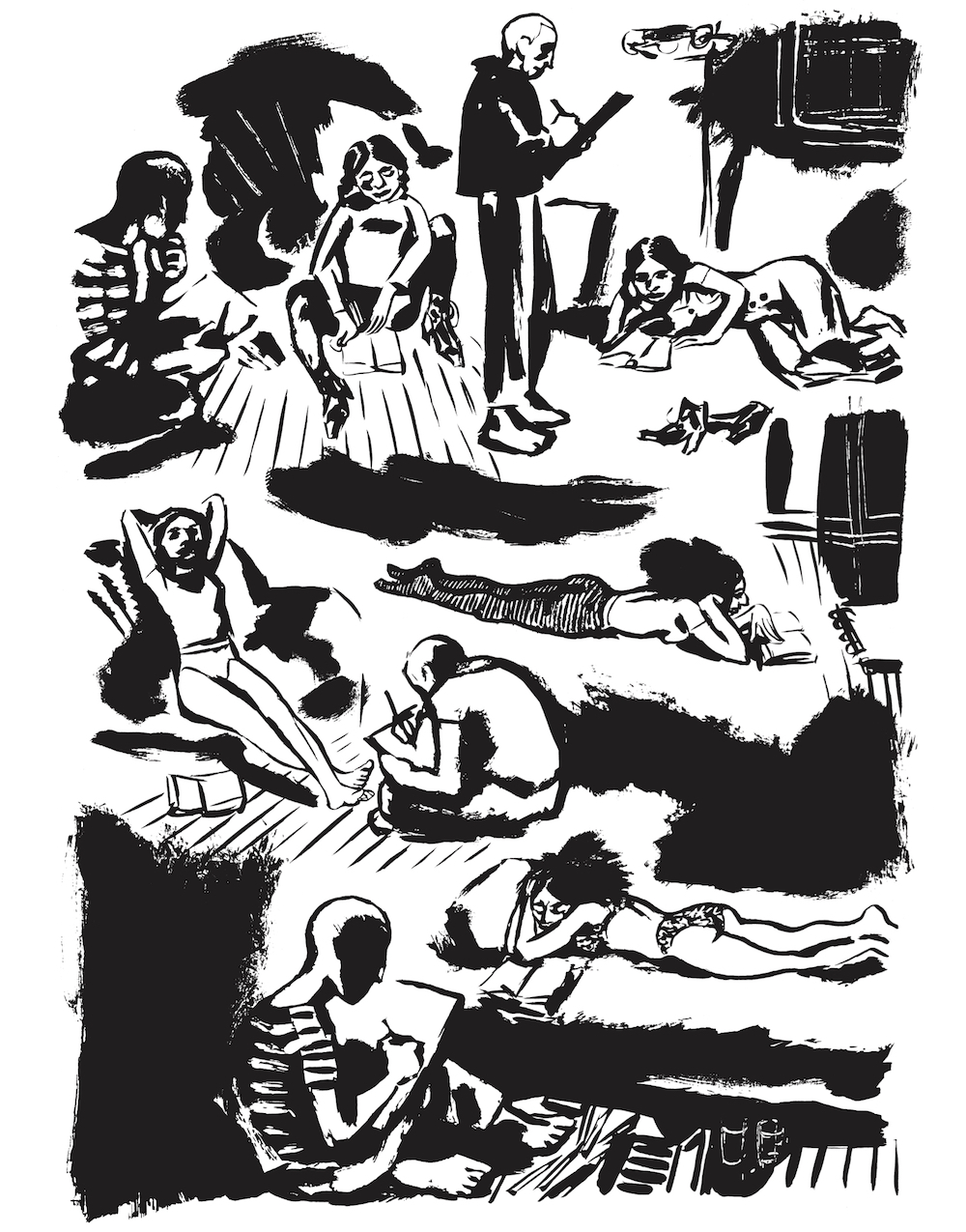
The artist-looking-at-model ur-scene serves as a splash page for chapter one, introducing the book’s most defining motif. The depicted artists include the author, Blutch (penname of French comics artist Christian Hincker), who makes a dream-like cameo in the collection’s longest and most surreal sequence (Jimmy Stewart later emerges from inside a police detective’s trench coat to molest a sleeping woman before kicked aside by the detective’s female partner). While apparently relishing the voyeuristic view, Blutch seems self-critical too, since some of these women have good reason to be afraid (the native woman bathing in a stream unaware of the Puritan husband ogling her from the trees is an example from the first chapter’s first scene).

And yet the images themselves—black ink portraits rendered in lines that waver from precisely thin to boldly splotchy—are vibrant testimonies of Blutch’s artistic energy. Mitchum is thrilling to flip through. Though the images are technically cartoons, the style of abstraction is idiosyncratic, sometimes warping into full abstraction—as when a dance hall scene devolves into thick wavering lines. If the style of the figures seems vaguely familiar, it’s probably because Craig Thompson imitated it so effectively in his 2003 Blankets.
Though I consider myself reasonably well-versed in comics history, I’m embarrassed to admit that I’m a newcomer to Blutch’s work and so am especially grateful to New York Review of Books for this first-time-in-English edition of the author’s collected five-part series from the 1990s. I tend to think of the 90’s as an unfortunate decade in comics, but that’s due to the superheroic norms of Marvel and DC and independent spin-off Image. But Blutch (along of course with Gaiman, McKean, the Hernandez brothers, Seth, Sacco, Clowes, and others) was producing exceptional work outside the U.S. mainstream.
Whatever his reputation when first publishing in the 90s, Blutch has also achieved literary acclaim, as evidenced by the recent inclusion of the eight-page sequence “I Want You” in the Paris Review. Though no excerpt is narratively representative, this one comes close enough. Like the entire first chapter, the segment is wordless. A male protagonist grows infatuated by a female stranger on the street and eventually works up the nerve to approach her. The two seem to hit it off and are soon at his apartment where he shows her his drawings (yes, of course he’s an artist), and next they’re at her more expensive apartment, where she is wearing increasingly fewer clothes as he draws and draws and draws. Then the wordless punchline: her husband arrives home, receives a kiss from his wife, and admires the artwork, giving the artist a literal thumbs up. The artist then returns to his home and receives a kiss from his girlfriend lounging topless on the couch. The joke is on the viewer, who Blutch duped into misperceiving the situation. What looked like a sexual attraction was just an artistic transaction: the artist wanted to draw the woman, and the woman wanted to be drawn.
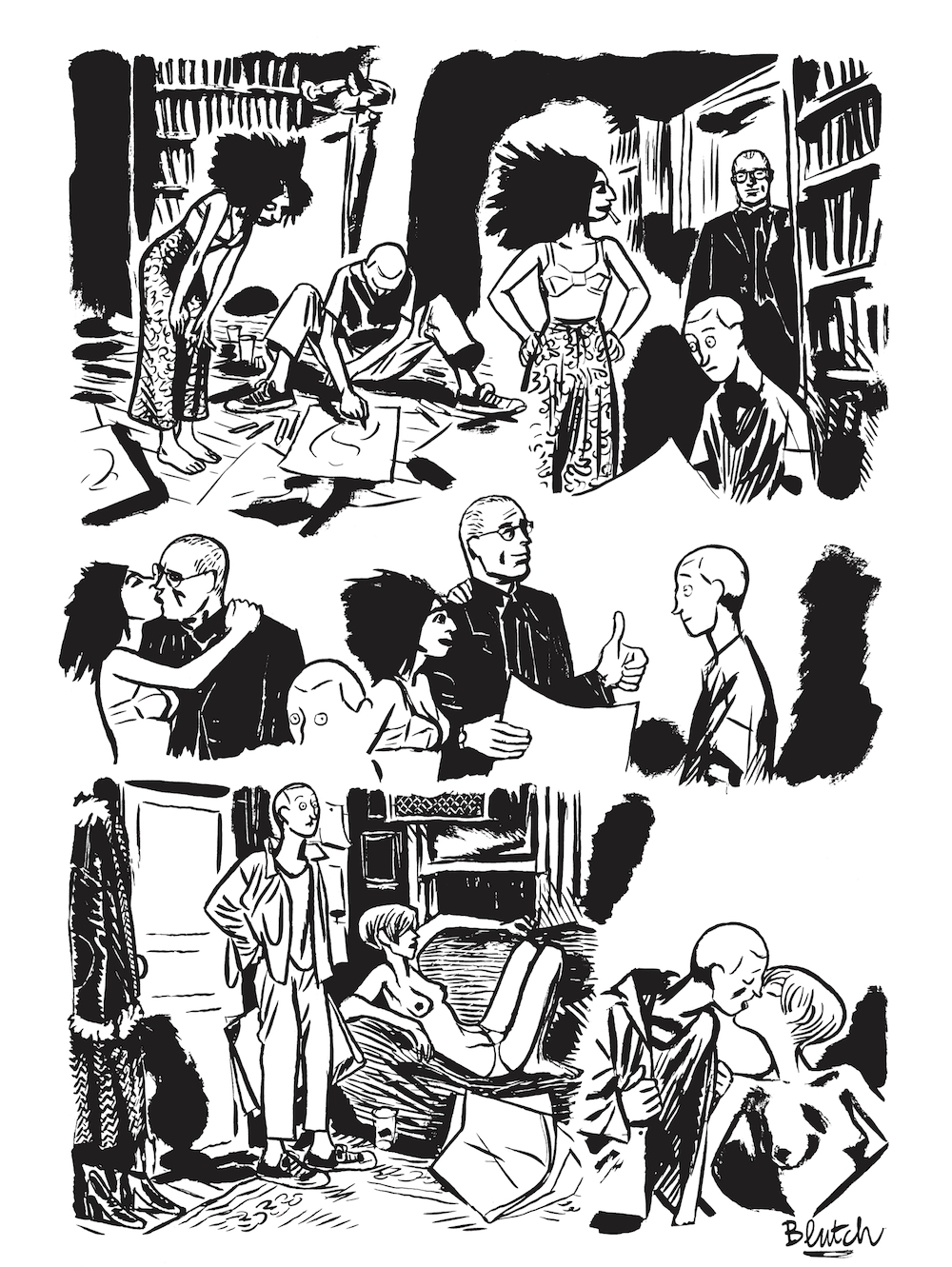
Mitchum was originally a loosely defined series with no repeating characters (while most are human, the fifth chapter features anthropomorphic bears), ranging from thirty to seventy black and white pages. Even the title provides little or no hook. I assume it’s referring to the actor Robert Mitchum (who makes an extended appearance in that dream-like third chapter) and not the deodorant of the same name. Mitchum can also mean ejaculate, presumably a further reference to the actor and his famed manliness.
Other sections include dialogue and brief narration, translated by Matt Madden (whose 99 Ways to Tell a Story I also recommend), and impressively lettered by Dean Sudarsky in a style that merges with Blutch’s art, an effect further emphasized by Blutch’s open style of talk balloons. His panels tend toward open too, creating a frameless visual flow that seems to move with the inky splashes of his penwork Or at least they do in some of the sections. The extended dream-like sequence is entirely framed in squares and rectangles, an extremely common approach that feels sudden and unexpected when first introduced half way through the collection.
![Mitchum - (Blutch) - Drame [CANAL-BD]](https://www.canalbd.net/img/couvpage/29/9782909990293_pg.jpg)
The prize story of the collection is chapter four’s “Ballet,” which features a female dancer performing overtop layouts of seemingly unrelated images rendered in contrastingly thin lines that further separate the dancer’s thick outlines. The eleven-page background story appears to involve female cowboys and fistfights, but it’s literally secondary to the figure obscuring half of the content. That extreme disconnect is a peculiar delight, pushing hard against the norms of narrative. The even bigger payoff comes in the unnumbered sixth chapter titled “unfinished and unpublished,” which opens with a draft of the background story before Blutch apparently decided to repurpose it as literal surface material for his dance.
The eclectic nature of Mitchum makes it hard to summarize (I didn’t mention the colonial artist painting a portrait of a slave-owner’s wife or the devil crow who barters for a man’s daughter so he can take her down to hell and—you guessed it—draw her), but Blutch accepts the term “emotional diary,” explaining in an interview with Paul Gravett: “Mitchum was my laboratory… Every kind of experiment was permitted. Their success or failure were secondary. The only rule to respect was the excitement of making them.”
Blutch translates that excitement to his viewers too. Ultimately, we’re not looking at his models. We’re looking at him.
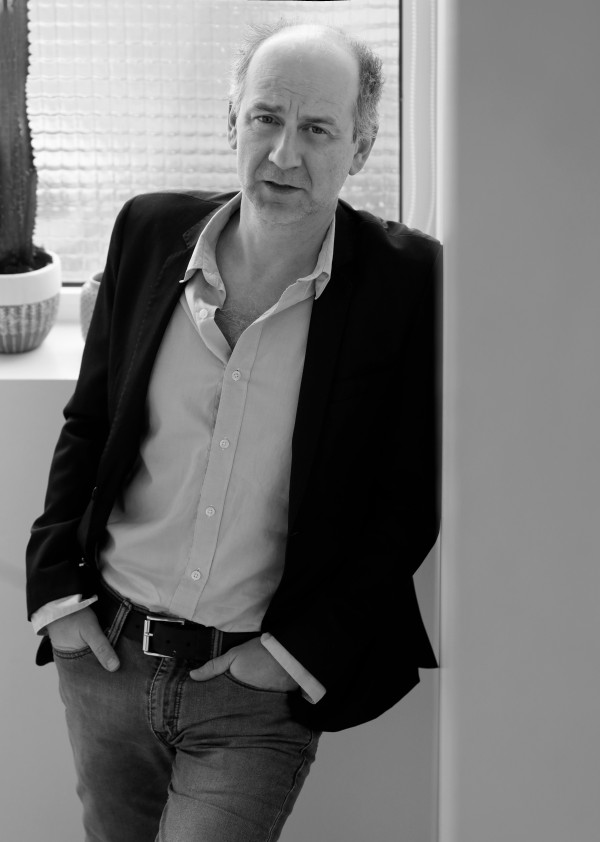
[A version of this post and MY OTHER RECENT REVIEWS appear in the BOOKS section of POPMATTERS.]
Tags: Blutch, Mitchum, New York Review of Books
- Leave a comment
- Posted under Uncategorized

































